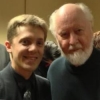-
Posts
2,963 -
Joined
-
Last visited
-
Days Won
14
Reputation Activity
-
 Uni got a reaction from airmanjerm in La La Land re-releases THE FURY!
Uni got a reaction from airmanjerm in La La Land re-releases THE FURY!
Oh, c'mon . . . no one's gonna pay you to order it!
- Uni
-
 Uni got a reaction from Wojo in La La Land re-releases THE FURY!
Uni got a reaction from Wojo in La La Land re-releases THE FURY!
Oh, c'mon . . . no one's gonna pay you to order it!
- Uni
-
 Uni got a reaction from Marian Schedenig in La La Land re-releases THE FURY!
Uni got a reaction from Marian Schedenig in La La Land re-releases THE FURY!
Oh, c'mon . . . no one's gonna pay you to order it!
- Uni
-

-
 Uni got a reaction from Quintus in Star Wars Episode VII: The Force Awakens (JJ Abrams 2015)
Uni got a reaction from Quintus in Star Wars Episode VII: The Force Awakens (JJ Abrams 2015)
Thank you, Sandor.
Going back through the thread a little (I missed a buncha pages), I couldn't resist responding to this:
That was exactly the trouble. Everything was too beautiful, too clean, too well-angled and precise and elegant. That was one of the biggest changes between the OT and the PT. Following an era of films that made the future and alternate universes look like antiseptic HAZMAT facilities, Star Wars was truck stop science fiction. The ships were dirty. The people were dirty. Everything had a tarnished, lived-in feel about it. It may seem like a small aesthetic detail, but it's one of the key reasons the milieu connected so readily with audiences everywhere.
Naboo, on the other hand, felt as artificial as you consider the dinosaurs from JP to be. It may have looked real, but it didn't feel authentic, y'know? Not to mention the fact that its decadent appearance played a major role in undermining the "story" Lucas was trying to tell. Amidala prattles on and on about how her people (whom we never see, incidentally, because Lucas always takes the "tell, don't show" approach) are "suffering" and "dying" . . . on a world where suffering apparently means not getting a second helping of caviar. The lush and expensive-looking backgrounds completely destroyed the Les Miserables portrait they were trying to paint.
Same goes for the Naboo starfighter. Is it nifty looking? I suppose. But I'll take Luke's scuffed-up X-wing any day of the week.
- Uni
-
 Uni got a reaction from karelm in Video of JW with orchestrator Herbert Spencer
Uni got a reaction from karelm in Video of JW with orchestrator Herbert Spencer
I always associate this documentary with a moment when I impressed myself—and first began to realize how intimately I was getting to know these scores. When it first cuts to the scene of him working at the piano, he plays a sequence of four chords (three identical, the fourth a couple of steps higher). I instantly knew the precise moment in the film he was composing for: after Han shoots the ground in the asteroid and the earthquake begins. I was a little amazed I could "Name That Tune" so easily.
That feeling was replaced a few seconds later with a staggering realization . . . I am watching him compose the music for that moment in cinematic history. Somehow the specificity of it just floored me. It was like seeing actual footage of of Lincoln writing the Gettysburg Address, or of Stravinsky's first performance of Rite of Spring, or something similarly historic. It was a singular act of creation that happened once and will never happen again (I mean for those notes in that score specifically). It's not like that's his best piece or anything. But it's that piece. And we got to see the inception of it. Too cool, really.
- Uni
-
 Uni got a reaction from Jilal in Video of JW with orchestrator Herbert Spencer
Uni got a reaction from Jilal in Video of JW with orchestrator Herbert Spencer
I always associate this documentary with a moment when I impressed myself—and first began to realize how intimately I was getting to know these scores. When it first cuts to the scene of him working at the piano, he plays a sequence of four chords (three identical, the fourth a couple of steps higher). I instantly knew the precise moment in the film he was composing for: after Han shoots the ground in the asteroid and the earthquake begins. I was a little amazed I could "Name That Tune" so easily.
That feeling was replaced a few seconds later with a staggering realization . . . I am watching him compose the music for that moment in cinematic history. Somehow the specificity of it just floored me. It was like seeing actual footage of of Lincoln writing the Gettysburg Address, or of Stravinsky's first performance of Rite of Spring, or something similarly historic. It was a singular act of creation that happened once and will never happen again (I mean for those notes in that score specifically). It's not like that's his best piece or anything. But it's that piece. And we got to see the inception of it. Too cool, really.
- Uni
-
 Uni got a reaction from Joni Wiljami in Video of JW with orchestrator Herbert Spencer
Uni got a reaction from Joni Wiljami in Video of JW with orchestrator Herbert Spencer
I always associate this documentary with a moment when I impressed myself—and first began to realize how intimately I was getting to know these scores. When it first cuts to the scene of him working at the piano, he plays a sequence of four chords (three identical, the fourth a couple of steps higher). I instantly knew the precise moment in the film he was composing for: after Han shoots the ground in the asteroid and the earthquake begins. I was a little amazed I could "Name That Tune" so easily.
That feeling was replaced a few seconds later with a staggering realization . . . I am watching him compose the music for that moment in cinematic history. Somehow the specificity of it just floored me. It was like seeing actual footage of of Lincoln writing the Gettysburg Address, or of Stravinsky's first performance of Rite of Spring, or something similarly historic. It was a singular act of creation that happened once and will never happen again (I mean for those notes in that score specifically). It's not like that's his best piece or anything. But it's that piece. And we got to see the inception of it. Too cool, really.
- Uni
-
 Uni got a reaction from Wojo in John Williams scoring all three new Star Wars films!!
Uni got a reaction from Wojo in John Williams scoring all three new Star Wars films!!
Hell, John's probably giddy (like the rest of us) at the thought that meddlesome George isn't around to bastardize the movies any more.
- Uni
-
 Uni got a reaction from Once in SCOREPEDIA: Guidelines, Suggestions, and Q&A
Uni got a reaction from Once in SCOREPEDIA: Guidelines, Suggestions, and Q&A
As most of you have seen on the other thread regarding this subject, some of us are attempting to take the initiative in building the foundational elements of a new website—a wiki encyclopedia devoted entirely to the subject of film music, called Scorepedia (click to head over there). In a sense, JWFan has the opportunity to become the “sponsor” of the website, the group of people most directly involved in its inception.
A lot of people have expressed interest in helping out, but there hasn’t been much action on the site itself yet. There are probably a couple of reasons for this. First, Scorepedia’s very nearly a blank page at this point. It’s always hard to take the first couple of steps, to chart unexplored territory, to know whether what you’re posting is approved, whether it helps the website, whether it’s too much, not enough, whatever. Second, a lot of people probably have the wrong idea about what a wiki is. (I know I did at first.) They may think the only acceptable submission is a complete, polished, and referenced article.
But that’s not the case at all. A wiki is a community built on shared information—any information that’s made available by any participant at any time. All it takes is someone posting a few lines about a specific score, or a composer, or an industry term, or a technique. Once that page exists, anyone can add their own knowledge, information, or experience to it. In other words, it’s a process
that grows by many small steps, not by a few great, galumphing gobs of information all at once.
So feel free to start small. In the beginning, the more pages we have, the better. New people who come across the site will begin to add more material themselves—if they have some good examples to follow. The key to the website’s success at this stage is for us to take the lead and provide those examples.
This may be your first time working with a wiki, or maybe your first time dealing with one centered around a specific topic like this one. No problem. Here are some basic parameters, ideas, and guidelines you can follow:
If you’ve never posted on Wikipedia before, do yourself a favor and take 30 minutes of time to read through the editing and formatting tutorial on Wikipedia. It’s really very simple—much easier than HTML—and it won’t take you long to get a grasp of things. You’ll need to sign up at Scorepedia in order to be able to post, and so others can see and follow the contributions and changes you make. (I would recommend that the folks from JWFan use a screen name there similar to the one they have here, so we can easily spot one another—but that’s entirely up to you.) NOTE: Because of early problems with spambots, there is no open registration at this time. If you want to become a contributor, contact the site's administrator, Marcus Stohr, either on this thread or directly at contact@scorepedia.org. Each time you check in at Scorepedia, click on the “Recent Changes” link in the left column. That’ll show you everything that’s been added or changed since you were last on the site. (In the beginning, that list should be fairly short and easy for everyone to follow.) Look over any newly-posted pages. If you have anything to add . . . do so! Make any necessary changes, edit passages for smoother reading, whatever catches your eye. When it comes to wiki, you don’t need permission, you don’t have to wait your turn, and you certainly don’t need to fret over how much or how little you have. Any input you can offer enhances the entire project—especially in the beginning. Please don’t let potential inexperience as a writer, or perhaps questionable command of the English language, discourage you either. Just make your writing as clear as you can. If there are any mistakes or grammatical errors in what you post, others will take care of them for you. That’s the beauty of a wiki: everyone works together to smooth out the wrinkles. We’re going to be directly importing the Wikipedia pages for the most prominent composers (Williams, Goldsmith, Barry, Horner, Zimmer, and so on) very soon. This should save us loads of time in the long run. So if you’re interested in starting a page about a specific individual in the industry, check Wikipedia first. If they’ve got a sizable page there, chances are it’ll be popping up at Scorepedia soon. (If you have someone in mind who has a Wikipedia page, but hasn’t made an appearance at Scorepedia yet, then post a request in this thread. We’ll make sure it gets transferred.) Once the composer pages do get moved in, we can edit them in any way we please to fit the milieu of our website; it won’t change the article’s appearance on Wikipedia, only on Scorepedia. So if you feel a composer’s ariticle doesn’t make prominent enough mention of your favorite score, then by golly, get in there and make that mention more prominent! Anecdotal information is often the best and most useful, especially for a place like Scorepedia. Posting that a certain score exists is fine; but if you have access to a story about how that score was composed, or recorded, or edited (or rejected!), that makes an article even better. This is the kind of thing that makes and excellent starting point for new articles. (Take a look under the heading "The Score" on the Alien page for several examples of appropriate anecdotes.) Here’s a line of thinking that might prevent some people from contributing right away: a) Important and/or popular scores should be posted before “minor” ones; b) Major scores deserve full treatment (i.e., complete and polished articles) from the start; c) I don’t have time to do a full article on a major score; d) so I’ll just wait for other folks to lay the foundation before I add my two cents.
But this is not an accurate perspective at all. As an example, check out the article on this “minor” score that’s already been put up. It’s a long way from being finished—there are plenty of anecdotal details to fill in, and I’d like to tie it to an article about John Barry’s score to Raise the Titanic, the other film from ITC Entertainment that sunk the production company but led to career expansion for Barry. I just didn’t have time to finish the whole thing during my first sitting. So what? It doesn’t have to be complete to be posted. And it doesn't have to be a game-changer of a score. This is the time to be planting seeds, not erecting whole forests of prefabricated information. Toss up some articles on a few of your favorite scores. Whittle away at them when you have time. They’ll be there when you come back. Filmusic terminology can be even simpler. If you have a definition for something you can sum up in a sentence or two, get it in there. (Look here for an example.) Others will expand on what you start. This is important: whenever you do start a new article, make sure you interlink any word or reference that would make a good page in itself. All you have to do is type the word or phrase in double brackets [[like this]]. That automatically creates a link to a new page on that subject. Don’t worry—you don’t have to fuss about going over and starting that new page yourself if you don’t want to. The term will appear in the text as a red link, which means a page exists but nothing’s been written on it yet. The idea of the red links is to inspire others who might know something about that subject to go start the article themselves. All they have to do is click on the link and start writing. (Take a look at that page on Clicks again. Follow one of those red links. You'll get the idea.) Use the Talk pages! Every article has a “Discuss” tab at the top. Clicking on it opens the article’s Talk page, which is a place for contributors to chat about changes, ideas, or plans for the article. Many of them will also include a To-Do list at the top, where the article’s initial author (and others) can suggest elements to round out the page. (If you’re curious about how Talk pages work, check out a few on Wikipedia.) This is an especially important step at this point; everyone should be communicating about new pages, material, and templates as we go, so we can establish some continuity as the site evolves. Remember that a wiki is designed to feature facts about specific subjects, not opinions. If we want to argue the merits or drawbacks of John's various works, we can come back here to do it. The information at Scorepedia should be just that: information. Be careful that you don't let your own high (or low) regard for any score or composer color the articles you write. That’ll do to start with. We’ll add more suggestions and guidelines as the process evolves. (We’re also working on Manual of Style specific to Scorepedia that’ll help people better understand the formatting and parameters for the site.) You can consider this sticky thread a place for questions and queries, ideas, brainstorming, encouragement . . . anything you need to help you get the ball rolling.
Ultimately, though, what Scorepedia needs most right now is freelance contributors, folks willing to take the initiative and forge the first links in the chain. If you’re interested in helping build this project, you don’t have to post a resume and tell us you’re interested. Just go to the site and start posting articles. That’ll let everyone know you’re on board.
I sincerely hope this will become a growing endeavor that JWFan can proudly put its stamp on. Eventually we’ll be opening the door to other internet chat groups and message boards . . . but for now, this one’s ours. Let’s see if we can make it something special.
- Uni
-
 Uni got a reaction from Marian Schedenig in John Williams scoring all three new Star Wars films!!
Uni got a reaction from Marian Schedenig in John Williams scoring all three new Star Wars films!!
Because it's Huge Problem Week at JWFan!
- Uni
-
 Uni got a reaction from Marcus Stöhr in SCOREPEDIA: Guidelines, Suggestions, and Q&A
Uni got a reaction from Marcus Stöhr in SCOREPEDIA: Guidelines, Suggestions, and Q&A
As most of you have seen on the other thread regarding this subject, some of us are attempting to take the initiative in building the foundational elements of a new website—a wiki encyclopedia devoted entirely to the subject of film music, called Scorepedia (click to head over there). In a sense, JWFan has the opportunity to become the “sponsor” of the website, the group of people most directly involved in its inception.
A lot of people have expressed interest in helping out, but there hasn’t been much action on the site itself yet. There are probably a couple of reasons for this. First, Scorepedia’s very nearly a blank page at this point. It’s always hard to take the first couple of steps, to chart unexplored territory, to know whether what you’re posting is approved, whether it helps the website, whether it’s too much, not enough, whatever. Second, a lot of people probably have the wrong idea about what a wiki is. (I know I did at first.) They may think the only acceptable submission is a complete, polished, and referenced article.
But that’s not the case at all. A wiki is a community built on shared information—any information that’s made available by any participant at any time. All it takes is someone posting a few lines about a specific score, or a composer, or an industry term, or a technique. Once that page exists, anyone can add their own knowledge, information, or experience to it. In other words, it’s a process
that grows by many small steps, not by a few great, galumphing gobs of information all at once.
So feel free to start small. In the beginning, the more pages we have, the better. New people who come across the site will begin to add more material themselves—if they have some good examples to follow. The key to the website’s success at this stage is for us to take the lead and provide those examples.
This may be your first time working with a wiki, or maybe your first time dealing with one centered around a specific topic like this one. No problem. Here are some basic parameters, ideas, and guidelines you can follow:
If you’ve never posted on Wikipedia before, do yourself a favor and take 30 minutes of time to read through the editing and formatting tutorial on Wikipedia. It’s really very simple—much easier than HTML—and it won’t take you long to get a grasp of things. You’ll need to sign up at Scorepedia in order to be able to post, and so others can see and follow the contributions and changes you make. (I would recommend that the folks from JWFan use a screen name there similar to the one they have here, so we can easily spot one another—but that’s entirely up to you.) NOTE: Because of early problems with spambots, there is no open registration at this time. If you want to become a contributor, contact the site's administrator, Marcus Stohr, either on this thread or directly at contact@scorepedia.org. Each time you check in at Scorepedia, click on the “Recent Changes” link in the left column. That’ll show you everything that’s been added or changed since you were last on the site. (In the beginning, that list should be fairly short and easy for everyone to follow.) Look over any newly-posted pages. If you have anything to add . . . do so! Make any necessary changes, edit passages for smoother reading, whatever catches your eye. When it comes to wiki, you don’t need permission, you don’t have to wait your turn, and you certainly don’t need to fret over how much or how little you have. Any input you can offer enhances the entire project—especially in the beginning. Please don’t let potential inexperience as a writer, or perhaps questionable command of the English language, discourage you either. Just make your writing as clear as you can. If there are any mistakes or grammatical errors in what you post, others will take care of them for you. That’s the beauty of a wiki: everyone works together to smooth out the wrinkles. We’re going to be directly importing the Wikipedia pages for the most prominent composers (Williams, Goldsmith, Barry, Horner, Zimmer, and so on) very soon. This should save us loads of time in the long run. So if you’re interested in starting a page about a specific individual in the industry, check Wikipedia first. If they’ve got a sizable page there, chances are it’ll be popping up at Scorepedia soon. (If you have someone in mind who has a Wikipedia page, but hasn’t made an appearance at Scorepedia yet, then post a request in this thread. We’ll make sure it gets transferred.) Once the composer pages do get moved in, we can edit them in any way we please to fit the milieu of our website; it won’t change the article’s appearance on Wikipedia, only on Scorepedia. So if you feel a composer’s ariticle doesn’t make prominent enough mention of your favorite score, then by golly, get in there and make that mention more prominent! Anecdotal information is often the best and most useful, especially for a place like Scorepedia. Posting that a certain score exists is fine; but if you have access to a story about how that score was composed, or recorded, or edited (or rejected!), that makes an article even better. This is the kind of thing that makes and excellent starting point for new articles. (Take a look under the heading "The Score" on the Alien page for several examples of appropriate anecdotes.) Here’s a line of thinking that might prevent some people from contributing right away: a) Important and/or popular scores should be posted before “minor” ones; b) Major scores deserve full treatment (i.e., complete and polished articles) from the start; c) I don’t have time to do a full article on a major score; d) so I’ll just wait for other folks to lay the foundation before I add my two cents.
But this is not an accurate perspective at all. As an example, check out the article on this “minor” score that’s already been put up. It’s a long way from being finished—there are plenty of anecdotal details to fill in, and I’d like to tie it to an article about John Barry’s score to Raise the Titanic, the other film from ITC Entertainment that sunk the production company but led to career expansion for Barry. I just didn’t have time to finish the whole thing during my first sitting. So what? It doesn’t have to be complete to be posted. And it doesn't have to be a game-changer of a score. This is the time to be planting seeds, not erecting whole forests of prefabricated information. Toss up some articles on a few of your favorite scores. Whittle away at them when you have time. They’ll be there when you come back. Filmusic terminology can be even simpler. If you have a definition for something you can sum up in a sentence or two, get it in there. (Look here for an example.) Others will expand on what you start. This is important: whenever you do start a new article, make sure you interlink any word or reference that would make a good page in itself. All you have to do is type the word or phrase in double brackets [[like this]]. That automatically creates a link to a new page on that subject. Don’t worry—you don’t have to fuss about going over and starting that new page yourself if you don’t want to. The term will appear in the text as a red link, which means a page exists but nothing’s been written on it yet. The idea of the red links is to inspire others who might know something about that subject to go start the article themselves. All they have to do is click on the link and start writing. (Take a look at that page on Clicks again. Follow one of those red links. You'll get the idea.) Use the Talk pages! Every article has a “Discuss” tab at the top. Clicking on it opens the article’s Talk page, which is a place for contributors to chat about changes, ideas, or plans for the article. Many of them will also include a To-Do list at the top, where the article’s initial author (and others) can suggest elements to round out the page. (If you’re curious about how Talk pages work, check out a few on Wikipedia.) This is an especially important step at this point; everyone should be communicating about new pages, material, and templates as we go, so we can establish some continuity as the site evolves. Remember that a wiki is designed to feature facts about specific subjects, not opinions. If we want to argue the merits or drawbacks of John's various works, we can come back here to do it. The information at Scorepedia should be just that: information. Be careful that you don't let your own high (or low) regard for any score or composer color the articles you write. That’ll do to start with. We’ll add more suggestions and guidelines as the process evolves. (We’re also working on Manual of Style specific to Scorepedia that’ll help people better understand the formatting and parameters for the site.) You can consider this sticky thread a place for questions and queries, ideas, brainstorming, encouragement . . . anything you need to help you get the ball rolling.
Ultimately, though, what Scorepedia needs most right now is freelance contributors, folks willing to take the initiative and forge the first links in the chain. If you’re interested in helping build this project, you don’t have to post a resume and tell us you’re interested. Just go to the site and start posting articles. That’ll let everyone know you’re on board.
I sincerely hope this will become a growing endeavor that JWFan can proudly put its stamp on. Eventually we’ll be opening the door to other internet chat groups and message boards . . . but for now, this one’s ours. Let’s see if we can make it something special.
- Uni
-
 Uni got a reaction from Marian Schedenig in SCOREPEDIA: Guidelines, Suggestions, and Q&A
Uni got a reaction from Marian Schedenig in SCOREPEDIA: Guidelines, Suggestions, and Q&A
As most of you have seen on the other thread regarding this subject, some of us are attempting to take the initiative in building the foundational elements of a new website—a wiki encyclopedia devoted entirely to the subject of film music, called Scorepedia (click to head over there). In a sense, JWFan has the opportunity to become the “sponsor” of the website, the group of people most directly involved in its inception.
A lot of people have expressed interest in helping out, but there hasn’t been much action on the site itself yet. There are probably a couple of reasons for this. First, Scorepedia’s very nearly a blank page at this point. It’s always hard to take the first couple of steps, to chart unexplored territory, to know whether what you’re posting is approved, whether it helps the website, whether it’s too much, not enough, whatever. Second, a lot of people probably have the wrong idea about what a wiki is. (I know I did at first.) They may think the only acceptable submission is a complete, polished, and referenced article.
But that’s not the case at all. A wiki is a community built on shared information—any information that’s made available by any participant at any time. All it takes is someone posting a few lines about a specific score, or a composer, or an industry term, or a technique. Once that page exists, anyone can add their own knowledge, information, or experience to it. In other words, it’s a process
that grows by many small steps, not by a few great, galumphing gobs of information all at once.
So feel free to start small. In the beginning, the more pages we have, the better. New people who come across the site will begin to add more material themselves—if they have some good examples to follow. The key to the website’s success at this stage is for us to take the lead and provide those examples.
This may be your first time working with a wiki, or maybe your first time dealing with one centered around a specific topic like this one. No problem. Here are some basic parameters, ideas, and guidelines you can follow:
If you’ve never posted on Wikipedia before, do yourself a favor and take 30 minutes of time to read through the editing and formatting tutorial on Wikipedia. It’s really very simple—much easier than HTML—and it won’t take you long to get a grasp of things. You’ll need to sign up at Scorepedia in order to be able to post, and so others can see and follow the contributions and changes you make. (I would recommend that the folks from JWFan use a screen name there similar to the one they have here, so we can easily spot one another—but that’s entirely up to you.) NOTE: Because of early problems with spambots, there is no open registration at this time. If you want to become a contributor, contact the site's administrator, Marcus Stohr, either on this thread or directly at contact@scorepedia.org. Each time you check in at Scorepedia, click on the “Recent Changes” link in the left column. That’ll show you everything that’s been added or changed since you were last on the site. (In the beginning, that list should be fairly short and easy for everyone to follow.) Look over any newly-posted pages. If you have anything to add . . . do so! Make any necessary changes, edit passages for smoother reading, whatever catches your eye. When it comes to wiki, you don’t need permission, you don’t have to wait your turn, and you certainly don’t need to fret over how much or how little you have. Any input you can offer enhances the entire project—especially in the beginning. Please don’t let potential inexperience as a writer, or perhaps questionable command of the English language, discourage you either. Just make your writing as clear as you can. If there are any mistakes or grammatical errors in what you post, others will take care of them for you. That’s the beauty of a wiki: everyone works together to smooth out the wrinkles. We’re going to be directly importing the Wikipedia pages for the most prominent composers (Williams, Goldsmith, Barry, Horner, Zimmer, and so on) very soon. This should save us loads of time in the long run. So if you’re interested in starting a page about a specific individual in the industry, check Wikipedia first. If they’ve got a sizable page there, chances are it’ll be popping up at Scorepedia soon. (If you have someone in mind who has a Wikipedia page, but hasn’t made an appearance at Scorepedia yet, then post a request in this thread. We’ll make sure it gets transferred.) Once the composer pages do get moved in, we can edit them in any way we please to fit the milieu of our website; it won’t change the article’s appearance on Wikipedia, only on Scorepedia. So if you feel a composer’s ariticle doesn’t make prominent enough mention of your favorite score, then by golly, get in there and make that mention more prominent! Anecdotal information is often the best and most useful, especially for a place like Scorepedia. Posting that a certain score exists is fine; but if you have access to a story about how that score was composed, or recorded, or edited (or rejected!), that makes an article even better. This is the kind of thing that makes and excellent starting point for new articles. (Take a look under the heading "The Score" on the Alien page for several examples of appropriate anecdotes.) Here’s a line of thinking that might prevent some people from contributing right away: a) Important and/or popular scores should be posted before “minor” ones; b) Major scores deserve full treatment (i.e., complete and polished articles) from the start; c) I don’t have time to do a full article on a major score; d) so I’ll just wait for other folks to lay the foundation before I add my two cents.
But this is not an accurate perspective at all. As an example, check out the article on this “minor” score that’s already been put up. It’s a long way from being finished—there are plenty of anecdotal details to fill in, and I’d like to tie it to an article about John Barry’s score to Raise the Titanic, the other film from ITC Entertainment that sunk the production company but led to career expansion for Barry. I just didn’t have time to finish the whole thing during my first sitting. So what? It doesn’t have to be complete to be posted. And it doesn't have to be a game-changer of a score. This is the time to be planting seeds, not erecting whole forests of prefabricated information. Toss up some articles on a few of your favorite scores. Whittle away at them when you have time. They’ll be there when you come back. Filmusic terminology can be even simpler. If you have a definition for something you can sum up in a sentence or two, get it in there. (Look here for an example.) Others will expand on what you start. This is important: whenever you do start a new article, make sure you interlink any word or reference that would make a good page in itself. All you have to do is type the word or phrase in double brackets [[like this]]. That automatically creates a link to a new page on that subject. Don’t worry—you don’t have to fuss about going over and starting that new page yourself if you don’t want to. The term will appear in the text as a red link, which means a page exists but nothing’s been written on it yet. The idea of the red links is to inspire others who might know something about that subject to go start the article themselves. All they have to do is click on the link and start writing. (Take a look at that page on Clicks again. Follow one of those red links. You'll get the idea.) Use the Talk pages! Every article has a “Discuss” tab at the top. Clicking on it opens the article’s Talk page, which is a place for contributors to chat about changes, ideas, or plans for the article. Many of them will also include a To-Do list at the top, where the article’s initial author (and others) can suggest elements to round out the page. (If you’re curious about how Talk pages work, check out a few on Wikipedia.) This is an especially important step at this point; everyone should be communicating about new pages, material, and templates as we go, so we can establish some continuity as the site evolves. Remember that a wiki is designed to feature facts about specific subjects, not opinions. If we want to argue the merits or drawbacks of John's various works, we can come back here to do it. The information at Scorepedia should be just that: information. Be careful that you don't let your own high (or low) regard for any score or composer color the articles you write. That’ll do to start with. We’ll add more suggestions and guidelines as the process evolves. (We’re also working on Manual of Style specific to Scorepedia that’ll help people better understand the formatting and parameters for the site.) You can consider this sticky thread a place for questions and queries, ideas, brainstorming, encouragement . . . anything you need to help you get the ball rolling.
Ultimately, though, what Scorepedia needs most right now is freelance contributors, folks willing to take the initiative and forge the first links in the chain. If you’re interested in helping build this project, you don’t have to post a resume and tell us you’re interested. Just go to the site and start posting articles. That’ll let everyone know you’re on board.
I sincerely hope this will become a growing endeavor that JWFan can proudly put its stamp on. Eventually we’ll be opening the door to other internet chat groups and message boards . . . but for now, this one’s ours. Let’s see if we can make it something special.
- Uni
-
 Uni got a reaction from Quintus in John Williams scoring all three new Star Wars films!!
Uni got a reaction from Quintus in John Williams scoring all three new Star Wars films!!
Yeah. I gotta admit it . . . you're probably right. It's fun to hope, dammit, but we all need to face a little reality here: JW's only been in the business for what, half a century? That's hardly enough time to build up a reputation. Word is the man's barely hanging on by his fingernails. After all, he came within a hair of having his score for Indy 4 rejected (I hear Desplat had the inside track to replace him). His representatives are out there as we speak trying to land him a decent job, but he just can't seem to get his foot in the door. There's just no getting around it: you've gotta be a shark if you want to keep working in the business after fifty years, even if you are the most popular, best-selling, and widely-sought-after composer in that business. John's just not the type.
You're right about the other part, too. We all know there can be multiple producers on a film, and there can even be multiple directors (especially if they're brothers!). But when it comes to composers, it's like Highlander: there can be only one! Unless, of course, you count Cloud Atlas, or The Changeling, or half the scores with Hans Zimmer's name on them, or many of the animated musicals produced by Disney—say, isn't Disney the one doing the new Star Wars movies. . . ?
Forget it. Everyone would be better off saving themselves the disappointment by just accepting the realities of the industry. Hell, if I know those Disney bastards, they've probably already offered the scoring job to one of the light grips. . . .
- Uni
-
 Uni got a reaction from Nick1Ø66 in John Williams scoring all three new Star Wars films!!
Uni got a reaction from Nick1Ø66 in John Williams scoring all three new Star Wars films!!
Yeah. I gotta admit it . . . you're probably right. It's fun to hope, dammit, but we all need to face a little reality here: JW's only been in the business for what, half a century? That's hardly enough time to build up a reputation. Word is the man's barely hanging on by his fingernails. After all, he came within a hair of having his score for Indy 4 rejected (I hear Desplat had the inside track to replace him). His representatives are out there as we speak trying to land him a decent job, but he just can't seem to get his foot in the door. There's just no getting around it: you've gotta be a shark if you want to keep working in the business after fifty years, even if you are the most popular, best-selling, and widely-sought-after composer in that business. John's just not the type.
You're right about the other part, too. We all know there can be multiple producers on a film, and there can even be multiple directors (especially if they're brothers!). But when it comes to composers, it's like Highlander: there can be only one! Unless, of course, you count Cloud Atlas, or The Changeling, or half the scores with Hans Zimmer's name on them, or many of the animated musicals produced by Disney—say, isn't Disney the one doing the new Star Wars movies. . . ?
Forget it. Everyone would be better off saving themselves the disappointment by just accepting the realities of the industry. Hell, if I know those Disney bastards, they've probably already offered the scoring job to one of the light grips. . . .
- Uni
-
 Uni got a reaction from Once in John Williams scoring all three new Star Wars films!!
Uni got a reaction from Once in John Williams scoring all three new Star Wars films!!
John is the classiest and humblest individual in an industry packed with ego monsters. Would that they were all his equals where etiquette is concerned.
Fascinating to see the reaction that an offhand comment, made during a performance featuring the theme to a franchise that's very big in the news right now (so why wouldn't he say something?), can create. Given that speculation is the only form of expression left to us where the new films are concerned, I guess it's only natural. But it's also fascinating how everyone seems to know, better than Williams, better than Abrams, better than Lucas, better than Disney, exactly how this is going to turn out. Wish I had that kind of foreknowledge.
Personally, I don't know how things will go. Were I to speculate, I think the key factor will probably be age. I doubt the question mark would be quite so big right now if the Maestro were still in his fifties.
Whatever the chances are at this point, for my part I remain hopeful that he'll be the one to do it—at least for the first installment.
- Uni
-
 Uni got a reaction from karelm in John Williams scoring all three new Star Wars films!!
Uni got a reaction from karelm in John Williams scoring all three new Star Wars films!!
John is the classiest and humblest individual in an industry packed with ego monsters. Would that they were all his equals where etiquette is concerned.
Fascinating to see the reaction that an offhand comment, made during a performance featuring the theme to a franchise that's very big in the news right now (so why wouldn't he say something?), can create. Given that speculation is the only form of expression left to us where the new films are concerned, I guess it's only natural. But it's also fascinating how everyone seems to know, better than Williams, better than Abrams, better than Lucas, better than Disney, exactly how this is going to turn out. Wish I had that kind of foreknowledge.
Personally, I don't know how things will go. Were I to speculate, I think the key factor will probably be age. I doubt the question mark would be quite so big right now if the Maestro were still in his fifties.
Whatever the chances are at this point, for my part I remain hopeful that he'll be the one to do it—at least for the first installment.
- Uni
-
 Uni got a reaction from Marian Schedenig in The one John Williams score everyone seems to love that you just don't get...
Uni got a reaction from Marian Schedenig in The one John Williams score everyone seems to love that you just don't get...
I see this thread as the inevitable afterbirth of the exercise that was the Top 10 list. For just about everyone here, it goes like this:
Top 10 thread: "These are the 10 best scores of all time!"
This thread: "Man, I just don't get you guys. . . ."
What's funny is that we're all experiencing exactly the same feelings and exhibiting exactly the same responses, but from the widest possible range of perspectives. As an example, here's what it looks like from my corner of the JW universe:
- I find it unfathomable that people don't recognize the greatness of Temple of Doom.
- On the other hand: Earthquake? Really?
- 1941 was my "acquired taste" experience. I will say that the La-La Land release went a long way toward persuading me. Often times it takes hearing what wasn't on the OST to find out what you've been missing.
- Hook has ten times the motive complexity of most of the other scores mentioned in this thread. It's simply a brilliant piece of compositional work.
- Ditto E.T. on the brilliance thing.
- But hey, we don't always disagree, either. I feel no shame in saying Witches of Eastwick hasn't made its mark on me yet.
- Jaws, on the other hand, is an extremely listenable classic.
- In every case where anyone doesn't see eye to eye with me, I'm twice the better person, because a) I clearly have superior taste and a better ear for music, and b) I'm exercising a benevolent amount of grace and patience by not informing everyone of the truth about how wrong they are.
I believe that last bit, while perhaps a tad exaggerated, is a tiny, usually-unspoken conceit everyone keeps to themselves while they read and comment along in these conversations. (C'mon . . . admit it! You know that's what you're thinking!
- Uni
-
 Uni got a reaction from Brónach in The one John Williams score everyone seems to love that you just don't get...
Uni got a reaction from Brónach in The one John Williams score everyone seems to love that you just don't get...
I see this thread as the inevitable afterbirth of the exercise that was the Top 10 list. For just about everyone here, it goes like this:
Top 10 thread: "These are the 10 best scores of all time!"
This thread: "Man, I just don't get you guys. . . ."
What's funny is that we're all experiencing exactly the same feelings and exhibiting exactly the same responses, but from the widest possible range of perspectives. As an example, here's what it looks like from my corner of the JW universe:
- I find it unfathomable that people don't recognize the greatness of Temple of Doom.
- On the other hand: Earthquake? Really?
- 1941 was my "acquired taste" experience. I will say that the La-La Land release went a long way toward persuading me. Often times it takes hearing what wasn't on the OST to find out what you've been missing.
- Hook has ten times the motive complexity of most of the other scores mentioned in this thread. It's simply a brilliant piece of compositional work.
- Ditto E.T. on the brilliance thing.
- But hey, we don't always disagree, either. I feel no shame in saying Witches of Eastwick hasn't made its mark on me yet.
- Jaws, on the other hand, is an extremely listenable classic.
- In every case where anyone doesn't see eye to eye with me, I'm twice the better person, because a) I clearly have superior taste and a better ear for music, and b) I'm exercising a benevolent amount of grace and patience by not informing everyone of the truth about how wrong they are.
I believe that last bit, while perhaps a tad exaggerated, is a tiny, usually-unspoken conceit everyone keeps to themselves while they read and comment along in these conversations. (C'mon . . . admit it! You know that's what you're thinking!
- Uni
-
 Uni got a reaction from Marian Schedenig in There needs to be a film score wiki. And JWFan should spearhead it.
Uni got a reaction from Marian Schedenig in There needs to be a film score wiki. And JWFan should spearhead it.
Okay . . . having once again come too late to that invaluable life lesson—that it's best just to shaddup until you know what you're talking about—I'm tempted to wiki away most of my previous post. I did, however, say up front that I knew little or nothing about what a wiki was, so I guess that can stand as a disclaimer to everything that followed.
I've spent the time since then getting a general education on what wiki is, and now I'm in a much better position to offer some discourse and ideas on the subject. So here goes:
- First off: I love the name. Scorepedia. I'm glad it's available to us.
- I also love both logos. Surely there's a way we could incorporate them both in different areas on the site. . . ?
- And I love, love, love the entire concept of "wiki." I've used Wikipedia, of course, but my grasp of its function and structure was waaaay off. I'd assumed that it was a collection of articles and entries that were submitted to a central editorial board, who checked it, proofread it, threw in a few "citations needed" here and there before posting it. If I'd known that it was a wide-open community of information sharing, where anyone could add or edit anything at any time, I probably would've started making contributions myself years ago. (Unfortunately, I'm not going to have time for that now. I'll be busy on another site. . . .)
- One of the great parts about this particular wiki—and what makes it so great for the community of people who love filmusic—is that "contributing" isn't nearly so involved as I'd led myself to believe. I thought that this was going to require putting together entire pages of information before we could really get the thing going. But that's not the case at all. Making a contribution can be as simple as writing a few sentences, which can either be added to an existing page . . . or it can be a whole new page. In other words, since Scorepedia is a clean slate, with nothing on it so far, starting a handful of entries consisting of only a paragraph or two will represent an exponential increase in its mass. What's more, those minimalistic entries can be the starting point for everyone else. If you start a page on Jerry Goldsmith, for instance, that just gives a quick summation of his career at the top, someone else will step in and add a few lines about his best-known scores, and then someone else will talk a bit about his contentious relationship with Ridley Scott during Alien, then yet another person will post a complete list of his works, and pretty soon someone who considers themselves a Goldsmith expert will post a biography that'll flesh out his early life and career. And so it goes, until the page creates itself from the tidbits of a dozen fans writing about a composer they love.
(I know I'm only telling you guys everything you already know about this wiki stuff. But this is my first time wrapping my head around it. Be patient with me. Once more, I'm processing aloud.)
- This is what takes my earlier thoughts about categorization and layout and submissions and especially that bit about an editorial staff, and renders it all garbage. None of that is necessary. Anyone can write anything they want. They don't even really have to worry about polishing it up . . . because those of us who are natural wordsmiths can act as the "editing fairies" (or "trolls," depending on your general regard for editors). We'd read through and do whatever copyediting needs to be done. We wouldn't change the content, of course—unless it's blatantly false, or unless we wanted to add something to it. We would just smooth out the grammatical wrinkles, which would in turn give the site more credibility as a source of information. That would be a significant portion of our contribution.
- Here's the thing: if each day about 20 people added a new page/entry, and added information to another 3-5 existing pages, in a month we'd all be floored by how fast the thing had grown. At that point—once we have a solid foundation, and agree on the direction and "feel" of the place—we could leak word of it to FSM and the Hornershrine and whoever else might be interested. At that point it would likely explode in size. So much the better. (This is proceeding from the aforementioned assumption that JWFan would be "spearheading" this undertaking.)
We could continue to use this thread as a think tank for brainstorming ideas for entries, discussing ways to prevent or halt edit wars (which now I have to admit may come up, if people let their opinions dictate what they write), and posting links to our own entries as examples of what kind of thing works and what doesn't.
I'm getting stoked about this thing now. I'm gonna start putting up some entries, see how it goes. . . .
- Uni
-
 Uni got a reaction from Marcus Stöhr in There needs to be a film score wiki. And JWFan should spearhead it.
Uni got a reaction from Marcus Stöhr in There needs to be a film score wiki. And JWFan should spearhead it.
Okay . . . having once again come too late to that invaluable life lesson—that it's best just to shaddup until you know what you're talking about—I'm tempted to wiki away most of my previous post. I did, however, say up front that I knew little or nothing about what a wiki was, so I guess that can stand as a disclaimer to everything that followed.
I've spent the time since then getting a general education on what wiki is, and now I'm in a much better position to offer some discourse and ideas on the subject. So here goes:
- First off: I love the name. Scorepedia. I'm glad it's available to us.
- I also love both logos. Surely there's a way we could incorporate them both in different areas on the site. . . ?
- And I love, love, love the entire concept of "wiki." I've used Wikipedia, of course, but my grasp of its function and structure was waaaay off. I'd assumed that it was a collection of articles and entries that were submitted to a central editorial board, who checked it, proofread it, threw in a few "citations needed" here and there before posting it. If I'd known that it was a wide-open community of information sharing, where anyone could add or edit anything at any time, I probably would've started making contributions myself years ago. (Unfortunately, I'm not going to have time for that now. I'll be busy on another site. . . .)
- One of the great parts about this particular wiki—and what makes it so great for the community of people who love filmusic—is that "contributing" isn't nearly so involved as I'd led myself to believe. I thought that this was going to require putting together entire pages of information before we could really get the thing going. But that's not the case at all. Making a contribution can be as simple as writing a few sentences, which can either be added to an existing page . . . or it can be a whole new page. In other words, since Scorepedia is a clean slate, with nothing on it so far, starting a handful of entries consisting of only a paragraph or two will represent an exponential increase in its mass. What's more, those minimalistic entries can be the starting point for everyone else. If you start a page on Jerry Goldsmith, for instance, that just gives a quick summation of his career at the top, someone else will step in and add a few lines about his best-known scores, and then someone else will talk a bit about his contentious relationship with Ridley Scott during Alien, then yet another person will post a complete list of his works, and pretty soon someone who considers themselves a Goldsmith expert will post a biography that'll flesh out his early life and career. And so it goes, until the page creates itself from the tidbits of a dozen fans writing about a composer they love.
(I know I'm only telling you guys everything you already know about this wiki stuff. But this is my first time wrapping my head around it. Be patient with me. Once more, I'm processing aloud.)
- This is what takes my earlier thoughts about categorization and layout and submissions and especially that bit about an editorial staff, and renders it all garbage. None of that is necessary. Anyone can write anything they want. They don't even really have to worry about polishing it up . . . because those of us who are natural wordsmiths can act as the "editing fairies" (or "trolls," depending on your general regard for editors). We'd read through and do whatever copyediting needs to be done. We wouldn't change the content, of course—unless it's blatantly false, or unless we wanted to add something to it. We would just smooth out the grammatical wrinkles, which would in turn give the site more credibility as a source of information. That would be a significant portion of our contribution.
- Here's the thing: if each day about 20 people added a new page/entry, and added information to another 3-5 existing pages, in a month we'd all be floored by how fast the thing had grown. At that point—once we have a solid foundation, and agree on the direction and "feel" of the place—we could leak word of it to FSM and the Hornershrine and whoever else might be interested. At that point it would likely explode in size. So much the better. (This is proceeding from the aforementioned assumption that JWFan would be "spearheading" this undertaking.)
We could continue to use this thread as a think tank for brainstorming ideas for entries, discussing ways to prevent or halt edit wars (which now I have to admit may come up, if people let their opinions dictate what they write), and posting links to our own entries as examples of what kind of thing works and what doesn't.
I'm getting stoked about this thing now. I'm gonna start putting up some entries, see how it goes. . . .
- Uni
-
 Uni got a reaction from Once in There needs to be a film score wiki. And JWFan should spearhead it.
Uni got a reaction from Once in There needs to be a film score wiki. And JWFan should spearhead it.
Okay . . . having once again come too late to that invaluable life lesson—that it's best just to shaddup until you know what you're talking about—I'm tempted to wiki away most of my previous post. I did, however, say up front that I knew little or nothing about what a wiki was, so I guess that can stand as a disclaimer to everything that followed.
I've spent the time since then getting a general education on what wiki is, and now I'm in a much better position to offer some discourse and ideas on the subject. So here goes:
- First off: I love the name. Scorepedia. I'm glad it's available to us.
- I also love both logos. Surely there's a way we could incorporate them both in different areas on the site. . . ?
- And I love, love, love the entire concept of "wiki." I've used Wikipedia, of course, but my grasp of its function and structure was waaaay off. I'd assumed that it was a collection of articles and entries that were submitted to a central editorial board, who checked it, proofread it, threw in a few "citations needed" here and there before posting it. If I'd known that it was a wide-open community of information sharing, where anyone could add or edit anything at any time, I probably would've started making contributions myself years ago. (Unfortunately, I'm not going to have time for that now. I'll be busy on another site. . . .)
- One of the great parts about this particular wiki—and what makes it so great for the community of people who love filmusic—is that "contributing" isn't nearly so involved as I'd led myself to believe. I thought that this was going to require putting together entire pages of information before we could really get the thing going. But that's not the case at all. Making a contribution can be as simple as writing a few sentences, which can either be added to an existing page . . . or it can be a whole new page. In other words, since Scorepedia is a clean slate, with nothing on it so far, starting a handful of entries consisting of only a paragraph or two will represent an exponential increase in its mass. What's more, those minimalistic entries can be the starting point for everyone else. If you start a page on Jerry Goldsmith, for instance, that just gives a quick summation of his career at the top, someone else will step in and add a few lines about his best-known scores, and then someone else will talk a bit about his contentious relationship with Ridley Scott during Alien, then yet another person will post a complete list of his works, and pretty soon someone who considers themselves a Goldsmith expert will post a biography that'll flesh out his early life and career. And so it goes, until the page creates itself from the tidbits of a dozen fans writing about a composer they love.
(I know I'm only telling you guys everything you already know about this wiki stuff. But this is my first time wrapping my head around it. Be patient with me. Once more, I'm processing aloud.)
- This is what takes my earlier thoughts about categorization and layout and submissions and especially that bit about an editorial staff, and renders it all garbage. None of that is necessary. Anyone can write anything they want. They don't even really have to worry about polishing it up . . . because those of us who are natural wordsmiths can act as the "editing fairies" (or "trolls," depending on your general regard for editors). We'd read through and do whatever copyediting needs to be done. We wouldn't change the content, of course—unless it's blatantly false, or unless we wanted to add something to it. We would just smooth out the grammatical wrinkles, which would in turn give the site more credibility as a source of information. That would be a significant portion of our contribution.
- Here's the thing: if each day about 20 people added a new page/entry, and added information to another 3-5 existing pages, in a month we'd all be floored by how fast the thing had grown. At that point—once we have a solid foundation, and agree on the direction and "feel" of the place—we could leak word of it to FSM and the Hornershrine and whoever else might be interested. At that point it would likely explode in size. So much the better. (This is proceeding from the aforementioned assumption that JWFan would be "spearheading" this undertaking.)
We could continue to use this thread as a think tank for brainstorming ideas for entries, discussing ways to prevent or halt edit wars (which now I have to admit may come up, if people let their opinions dictate what they write), and posting links to our own entries as examples of what kind of thing works and what doesn't.
I'm getting stoked about this thing now. I'm gonna start putting up some entries, see how it goes. . . .
- Uni
-
 Uni got a reaction from alicebrallice in Disney to produce new Star Wars film
Uni got a reaction from alicebrallice in Disney to produce new Star Wars film
It'll never happen. Word on the street says the world's going to end in 2012.
- Uni
-
 Uni got a reaction from wanner251 in The "too many LOTR/Hobbit/Tolkien" threads poll - vote now!
Uni got a reaction from wanner251 in The "too many LOTR/Hobbit/Tolkien" threads poll - vote now!
Now this is a worthwhile poll!
I'm all for the third option, on one condition: that we can rely on you Mods to step in an kill any truly idiotic threads from trolls or people who just want to stir up dissension around here. (Your commendable actions in the last few minutes are exactly what I'm talking about, Jason.) Aside from that, some of us have already put our feelings on the table: while this may be a JW fan site, other subjects will inevitably come into play, and not everyone is going to want to talk about every one of those subjects. That doesn't mean we need to segregate every single topic into its own subforum. I doubt anyone wants to have to check eight or ten different places for new replies every time they come here. People who aren't into LOTR or its music can choose to demonstrate maturity enough to pass those subjects by and engage in topics they do want to discuss.
One more thought on this: to be perfectly frank—and based purely on my own observations—I don't see the Howard Shore/LOTR fans turning other threads in the direction of Middle Earth most of the time. It's the anti-Rings folks who seem to feel it necessary to drop snide comments into the midst of unrelated conversations that wind up turning those threads into discussions about LOTR (since Shore's fans will then inevitably leap in to defend their honor). If the numbskulls will agree to stop using every single opportunity they can find to take their Shore shots, the commentary on that subject would decrease by nearly half.
- Uni
-
 Uni got a reaction from crocodile in JWFAN Members Top 10 John Williams scores lists
Uni got a reaction from crocodile in JWFAN Members Top 10 John Williams scores lists
Uni's New Year Resolution #64:
Give Lost World and Prisoner of Azkaban another try.
- Uni














